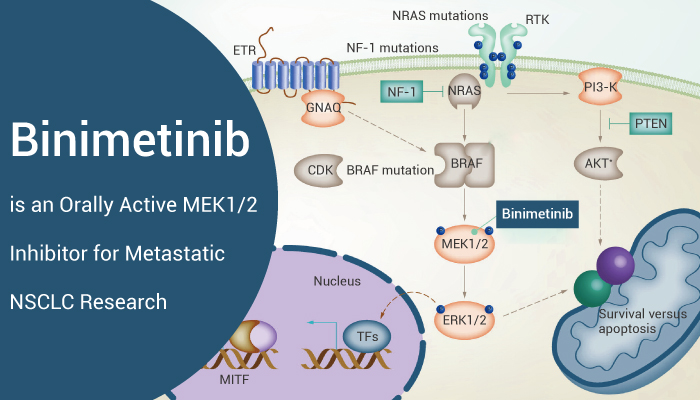Mitogen-activated protein kinase (MAPKs) are a family of conservative protein serine/threonine kinases that respond to a variety of extracellular stimuli and participate in gene expression, cell metabolism, proliferation, differentiation, and apoptosis. Moreover, classical MAPK signaling pathways mainly include ERK1/2, p38s, JNKs, and ERK5, while ERK3/4, ERK7/8, and NLK belong to non-classical MAPK pathways, MEK1/2 pathway is one of the most important signaling pathways among them.
Mitogen-activated protein kinase kinases 1 and 2 (MEK1/2) are the crucial part of the RAS-RAF-MEK-ERK pathway (or ERK pathway). Moreover, MEK1/2 is involved in the regulation of various cellular processes including proliferation, survival, and differentiation et al. In addition, as an essential node of the whole ERK1/2 signaling pathway, MEK1/2 are responsible for transmitting signals from a variety of upstream kinases and are the only activators of downstream ERK1/2, known as the “gatekeeper” of ERK1/2. Importantly, targeting MEK has become an important strategy for cancer research. Hence, we will introduce a MEK1/2 Inhibitor-Binimetinib (MEK162).

Binimetinib is an orally active MEK1/2 Inhibitor (IC50=12 nM) for cancer research.
Binimetinib shows good activities in vitro. Binimetinib inhibits MEK and is effective against neuroblastoma tumor cells with low NF1 expression. In addition, Binimetinib (1 μM; 1 h) inhibits RAS/MAPK pathway activity. Besides, Binimetinib (1 μM; 1 h) increases MEK phosphorylation and inhibition of ERK phosphorylation without changes in total levels of MEK and ERK protein.
In a word, Binimetinib is a promising MEK1/2 inhibitor for cancer research.
Reference:
[1] Wang C, et al. Eur J Med Chem. 2021 Jun 5;218:113386.
[2] Woodfield SE, et al. BMC Cancer. 2016 Mar 1;16:172.